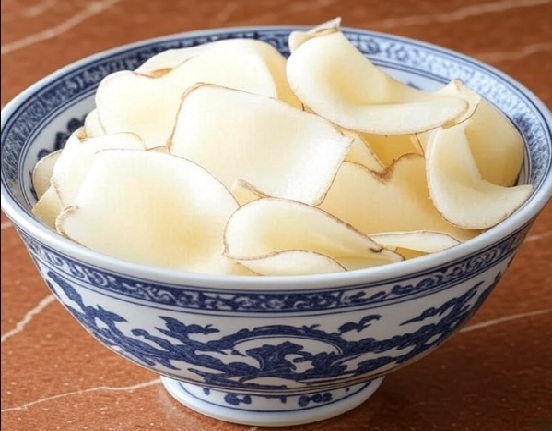Sea Coconut

Sea Coconut (Hai Di Lou): A Moistening Herb for Lungs, Throat, and Dry Cough Relief
Introduction
Sea coconut, known as Hai Di Lou (海底椤) in Traditional Chinese Medicine (TCM), is a soothing, moistening herb valued for its ability to nourish the Lungs, relieve dry coughs, and ease throat irritation. With its sweet and cooling nature, sea coconut is especially popular in herbal desserts and soups designed to treat dryness, hoarseness, and lingering coughs after illness. It is a delicious way to hydrate the respiratory system and promote long-term lung health.
What Is Sea Coconut?
Hai Di Lou refers to the processed fruit of the Lodoicea maldivica (coco de mer palm) or more commonly the fruit of certain palm species used in TCM for lung-moistening purposes. In traditional practice, it is classified as sweet and slightly cold, entering the Lung and Stomach meridians. Sea coconut is used to nourish yin, moisten dryness, and clear residual heat from the Lungs, making it especially effective after respiratory infections or exposure to dry environments.
Health Benefits of Sea Coconut
Moistens the Lungs and Relieves Dry Cough
Hai Di Lou is ideal for soothing dry, hacking coughs and throat discomfort caused by Lung yin deficiency.
Soothes Throat Irritation and Hoarseness
Its hydrating properties help restore moisture to the vocal cords and relieve chronic dryness in singers, speakers, or dry air exposure.
Clears Residual Heat and Nourishes Yin
Sea coconut helps cool and hydrate the Lungs after fevers, infections, or prolonged heat conditions.
Supports Digestive Moisture and Hydration
It can help soothe dry mouth, thirst, and dryness in the digestive tract, making it beneficial for post-fever recovery.
Enhances Skin Hydration and Glow
By nourishing internal fluids, it indirectly supports skin moisture and elasticity.
How to Use Sea Coconut
In Herbal Soups or Desserts
Use 15–30 grams of dried sea coconut simmered with white fungus, snow pear, or lily bulb to create a moistening and soothing dessert soup.
In Lung-Nourishing Herbal Teas
Brew with mulberry leaf, American ginseng, or chrysanthemum for a hydrating tea that supports the respiratory system.
In Recovery or Post-Illness Tonics
Incorporate into soups or stews designed for yin recovery and long-term Lung health.
Where to Buy Sea Coconut
You can find Hai Di Lou at the following places:
-
Chinese herbal medicine shops
-
Asian grocery stores (dried herbal dessert sections)
-
Online retailers such as Amazon, iHerb, or TCM specialty stores
Look for:
-
Clean, white to pale yellow dried slices or chunks
-
Sulfur-free and pesticide-free labeling
-
Soft but well-dried pieces without mustiness
Are There Any Side Effects?
Sea coconut is very safe when used appropriately. Those with digestive coldness or loose stools should use it in moderation, as its cooling nature can exacerbate such conditions if overconsumed. Best paired with a small amount of warming herbs like ginger for cold-sensitive individuals.
Conclusion
Sea coconut, or Hai Di Lou, is a sweet, moistening herb in TCM that soothes dry coughs, hydrates the throat, nourishes Lung yin, and clears residual heat. Whether brewed into delicious soups or calming teas, this gentle herb offers a tasty and effective way to restore moisture, comfort, and vitality to the body’s delicate systems.
FAQs
Can I eat sea coconut every day?
Yes, moderate daily use is safe, especially for dry coughs, throat discomfort, or dry environments.
What does sea coconut taste like?
It has a mildly sweet, refreshing taste with a smooth, soothing texture when cooked.
Is sea coconut safe for children?
Yes, in small amounts and under supervision, particularly for soothing dry coughs and throat irritation.

